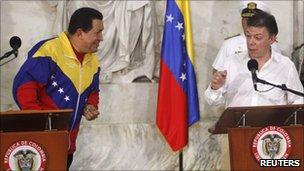Venezuela and Colombia agree diplomatic roadmap
- Published

After months of conflict, Venezuela and Colombia have restored ties
On arriving in the colonial city of Santa Marta, the plane of the Colombian leader, Juan Manuel Santos, flew both the Colombian and Venezuelan flags from the cockpit window.
President Chavez arrived shortly after, dressed in a tracksuit top of the Venezuelan flag. The first thing he did was wish President Santos a happy birthday.
"He's 35 today!" Mr Chavez joked of the 59-year-old Santos.
But beyond the friendliness and signs of fraternity, there were important issues on the table between the two men.
"We have established a roadmap with which to advance," said President Santos, announcing five areas - ranging from job creation along the border to security - in which Colombia and Venezuela had agreed to co-operate.
The meeting follows months of intransigence under his predecessor, Alvaro Uribe.
Change of tone
It is a rapid turn of events. Just two weeks ago, Mr Chavez broke off diplomatic relations after the Colombian government accused Venezuela of harbouring leftist Farc rebels.
So was a change of resident in the presidential palace in Bogota all that was needed to end this diplomatic conflict?
"The very personal nature of the dispute between Chavez and Uribe meant that it was going to be absolutely impossible for them to reconstruct," says Dr Sandra Borda of the University of the Andes in Bogota.
But the former Venezuelan Vice-Foreign Minister, Adolfo Taylhardat, does not believe a change in the Colombian presidency will provide the key.
"Mr Uribe wasn't the main obstacle," he says.
"For President Chavez, the biggest problem was the agreement over US access to seven military bases in Colombia. He wants to see that annulled and see his 'Bolivarian' ideas adopted in Bogota. Neither of which he is going to achieve with Mr Santos."
Re-opening the doors
Following the talks, Mr Chavez spoke directly about the concerns many Colombians hold about him, saying he had no intention of trying to foist his socialist revolution on Colombia.
He also publicly reiterated his assertion that he has no links with the left-wing guerrilla group, the Farc.
"I don't support the guerrillas nor terrorism," he said, adding that his military "hasn't found a single guerrilla camp in Venezuela".
The issue of the alleged presence of the Farc leadership on Venezuelan soil has not gone away. But Dr Borda thinks that in the short term, they will focus on less controversial issues, such as the return of ambassadors to Caracas and Bogota, and - crucially - reopening the border to bilateral trade.
Colombia depends on the Venezuelan market for its exports, particularly in meat, dairy products and plastic goods and Venezuela is in dire near of Colombia's exports.
Bilateral trade has fallen by up 80% because of the dispute.
"I think trade is an area which is in both their interests to see re-established quickly," says Sandra Borda. "They can use it to build up their understanding on that issue before moving on to more complicated topics such as cross-border security".
'Unnecessary conflict'
As for the speed of the thaw, Mr Taylhardat thinks it reveals the truth behind much of the rhetoric of the past few weeks.
The real reason, he says, is the influence of other regional leaders. The Unasur head, Nestor Kirchner, and President Lula of Brazil both played a role in mediating the crisis.
"Many leaders in the region were becoming annoyed at the extension of a conflict they saw as absurd and unnecessary," Mr Taylhardat believes.
From Colombia, too, there has been a noticeable change in approach towards Mr Chavez.
Mr Santos was the candidate for the same conservative party as Mr Uribe and stood on a platform of continuity with the former president's popular security policies.
But Dr Borda believes it is in international relations where he will distance himself from the past, as voters in both countries have become tired of the constant bickering.
"I think Mr Santos wants to show that it is possible to maintain a firm hand with the Farc but without generating these constant tensions with Venezuela. He has learnt that, rather than berate Chavez using microphones and inflammatory public statements, there are other, quieter ways to deal with him."
For many Venezuelans and Colombians, if that means the fiery rhetoric will go down, and cross-border trade will pick up, then it will be a welcome change.
- Published11 August 2010
- Published21 June 2010
- Published6 August 2010